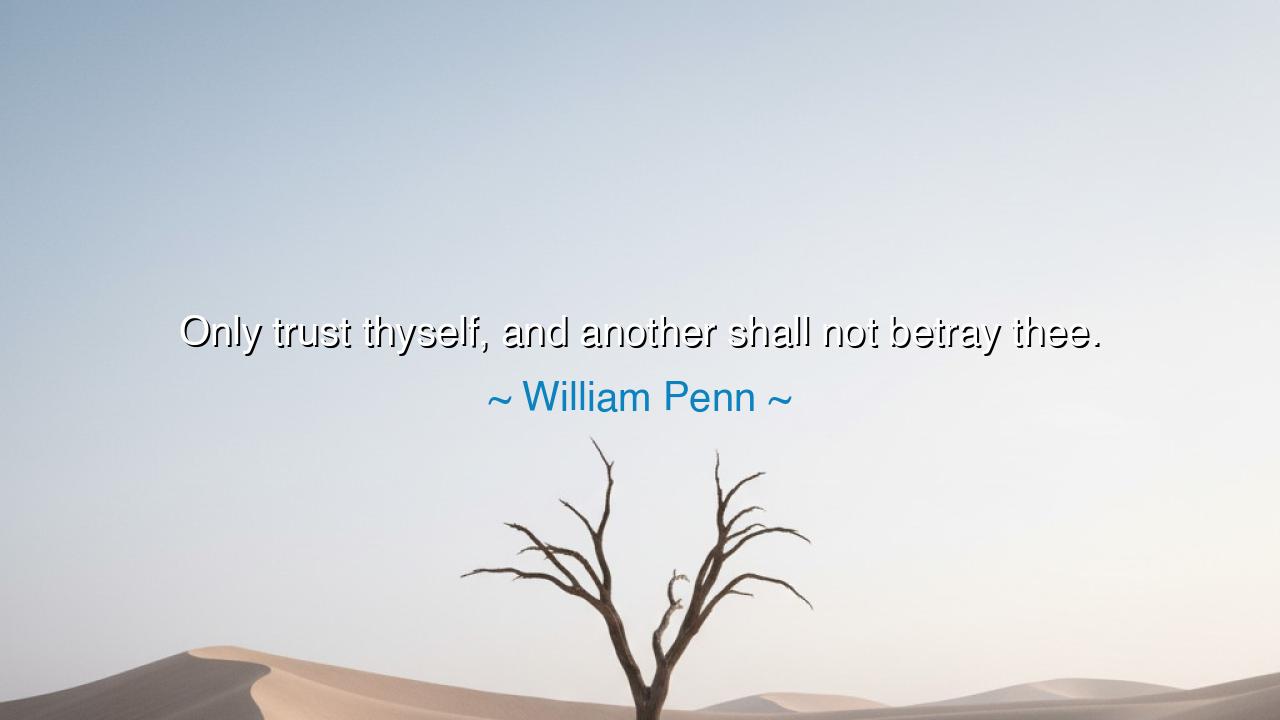
Only trust thyself, and another shall not betray thee.






The words of William Penn—“Only trust thyself, and another shall not betray thee.”—ring with the stern wisdom of experience, like the voice of an elder warning those who would walk unguarded into the snares of the world. They remind us that the greatest safeguard against the pain of betrayal lies in the strength of self-reliance. For when a man leans too heavily upon others for his security, his happiness, or his judgment, he gives into their hands the power to wound him. But when he learns to trust himself above all, he builds a fortress no treachery can breach.
To trust thyself is not to reject the fellowship of others, but to anchor one’s life upon inner strength rather than the shifting tides of men’s promises. The ancients taught this in many forms. The Stoics declared that the wise man seeks virtue within, not applause without. The Hebrew prophet warned, “Put not your trust in princes, in whom there is no salvation.” And even the poets sang of heroes who, forsaken by allies, prevailed because they leaned upon their own courage. Thus, Penn’s words are the echo of a timeless law: that the man who rules himself cannot be undone by another’s betrayal.
History gives us countless proofs. Julius Caesar, mighty in power, placed too much faith in those he called friends. It was not foreign foes who destroyed him, but the daggers of men he had trusted most, including Brutus, whom he loved like a son. His tragedy reveals the peril of placing full trust outside oneself. By contrast, consider Abraham Lincoln. In a time of civil war, he surrounded himself with rivals and adversaries in his cabinet. He knew they might betray his confidence, but he anchored his course in his own conscience and conviction. Thus, even when opposed, he could not be undone, for his trust was rooted first within himself.
The paradox of Penn’s teaching is that it is both a shield and a burden. For to trust thyself requires strength, discipline, and the courage to stand alone when others falter. It demands that one cultivate judgment, so that one’s own counsel may be worthy of trust. Many would rather surrender this burden, relying blindly on the promises of others. Yet in doing so, they invite betrayal and disappointment. Better, says Penn, to bear the weight of self-reliance than to be shattered by the treachery of misplaced faith.
Yet his words do not forbid all trust. Friendship, loyalty, and fellowship remain treasures of life. But Penn warns us not to make these our foundation. To love others is noble, but to surrender one’s soul to another’s keeping is folly. The wise man shares bonds of trust, yet he does not give away the keys to his peace. He walks in friendship, but his strength lies within, so that even if friends depart, he remains whole.
The lesson for us is clear: build your life on the rock of inner trust. Cultivate wisdom, so your judgment is sound. Strengthen your character, so your word is steadfast. Train your spirit, so your peace does not depend on the faithfulness of others. In this way, you may walk among men freely, enjoying their company, yet never enslaved to their approval or vulnerable to their betrayal.
Practically, this means learning to listen to your conscience before the crowd, weighing your decisions by principle rather than popularity. It means practicing self-discipline, so that you can trust yourself not to falter when temptation comes. It means embracing solitude, so that you may grow familiar with your own soul and not fear its silence. In doing so, you become one who may walk among others without fear, for you have already secured the trust that matters most.
So let William Penn’s words be a lamp unto your path: “Only trust thyself, and another shall not betray thee.” The world may deceive, friends may falter, allies may turn into foes. But the man who anchors himself in his own integrity shall remain unshaken. Trust in yourself, and though the winds of betrayal blow, they shall find no entrance to your heart.






AAdministratorAdministrator
Welcome, honored guests. Please leave a comment, we will respond soon